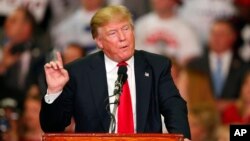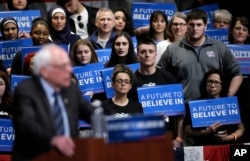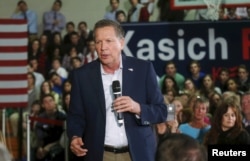New political surveys in the United States show support for Republican presidential front-runner Donald Trump may be eroding as voters cast ballots Tuesday in nominating contests in four more states.
A new Washington Post/ABC News poll showed 34 percent of Republicans still favor the billionaire real estate mogul, compared to 25 percent for Texas Senator Ted Cruz, 18 percent for Florida Senator Marco Rubio and 13 percent for Ohio Governor John Kasich.
That's a narrower Trump lead than in previous surveys conducted by the newspaper and television network.
The same poll also showed that Trump trails both Cruz and Rubio in head-to-head matchups if the one-time 17-candidate field is winnowed further.
Lead narrowing
An NBC News/Survey Monkey poll showed Trump with a bigger lead of nearly 2-to-1 (39 percent to 20 percent) over Cruz, with Rubio and Kasich trailing, but that margin was also narrower than it had been.
The new surveys come at a time when establishment Republicans, including the party's losing 2012 nominee, Mitt Romney, have embarked on an all-out effort to thwart Trump, a political novice and one-time television reality show host, from winning the party's presidential nomination.
They fear he is too unpredictable and would lose to the leading Democratic candidate, former Secretary of State Hillary Clinton, in November’s national election to succeed President Barack Obama, who leaves office in January 2017.
The four remaining Republican contenders face voters in four distinctly different states on Tuesday, the country’s car manufacturing hub in Michigan, the conservative Deep South state of Mississippi, the sparsely populated western state of Idaho and the Pacific island state of Hawaii.
Polls show Trump ahead in Michigan and Mississippi, but there have been scant surveys in the other two states.
Party convention
The candidates are vying for delegates to July’s Republican national convention Cleveland, where the party’s presidential nominee will be picked. Trump is ahead so far in the contest, but nowhere near a majority in the months-long campaign.
US Presidential Candidate Delegate Count
Delegate Count
Here is an estimated delegate count for each candidate:
Republicans
Donald Trump: 621
Ted Cruz: 396
John Kasich: 138
Democrats
Hillary Clinton: 1,561
Bernie Sanders: 800
Total delegates needed for party nomination:
Democrats: 2,383
Republicans: 1,237
* As of March 16, 2016
Tuesday’s biggest prize is Michigan and its 59 delegates.
Candidates will win a share of those delegates based on their proportion of the vote count, just as they will with the 91 total delegates available in Mississippi, Idaho and Hawaii.
In the Democratic race, primaries are only being held in Michigan and Mississippi.
Clinton has held big leads in polls in both states over Vermont Senator Bernie Sanders, a democratic socialist who is her lone challenger.
Clinton holds a huge delegate lead and at recent campaign events has talked about a potential matchup against Trump in the November election.
She told supporters Monday in Michigan the sooner she becomes the Democratic nominee, the more she can focus on the Republicans.
The Democratic national convention will be held in Philadelphia in July.
Independent: No campaign
Also Monday, former three-term New York City Mayor Michael Bloomberg announced he will not make a third-party run.
Bloomberg spent months considering running as an independent, but said in an editorial posted by the Bloomberg View that he does not believe he could win the election and that there would be a good chance his candidacy would lead to Trump or Cruz being elected.
"That is not a risk I can take in good conscience," he added.
The 74-year-old Democrat-turned-Republican-turned-Democrat-turned Independent lambasted Trump, saying, "He has run the most divisive and demagogic presidential campaign I can remember, preying on people’s prejudices and fears."
In an effort to block Trump from capturing the party's 2016 presidential nomination, conservative and Republican groups are mounting acerbic new television advertising campaigns.
In all, several anti-Trump organizations say they plan to spend at least $10 million in the next week on the ads.
Attack ads
Many of them are aimed at voters in the southeastern state of Florida and the Midwestern state of Illinois, two delegate-rich states where Republicans are holding March 15 party nominating elections and political surveys show Trump with leads over his remaining three opponents.
The ads characterize Trump as a liberal out of touch with the dominant conservative character of the Republican party, a military draft dodger, and a tycoon with little empathy for the powerless who have stood in the path of his business empire.
Club for Growth Action, a conservative, anti-tax organization, has one ad running in Florida, saying Trump "hides behind bankruptcy laws to duck paying his bills and kill American jobs. He even tried to kick an elderly widow out of her home through eminent domain. Real tough guy."
Another group, American Future Fund, called Trump, a one-time television reality show host, a draft dodger who has disparaged American prisoners of war captured by the North Vietnamese more than four decades ago and "hasn't served his country a day in his life. Donald Trump is a phony. Stop him now."
Rather than respond to the ad campaign against him with television ads of his own, Trump said he would continue to attack his opponents with tweets from his Twitter account.
"We cannot let the failing Republican establishment, who could not stop Obama, ruin the movement with millions of dollars in false ads!" Trump said Monday.









